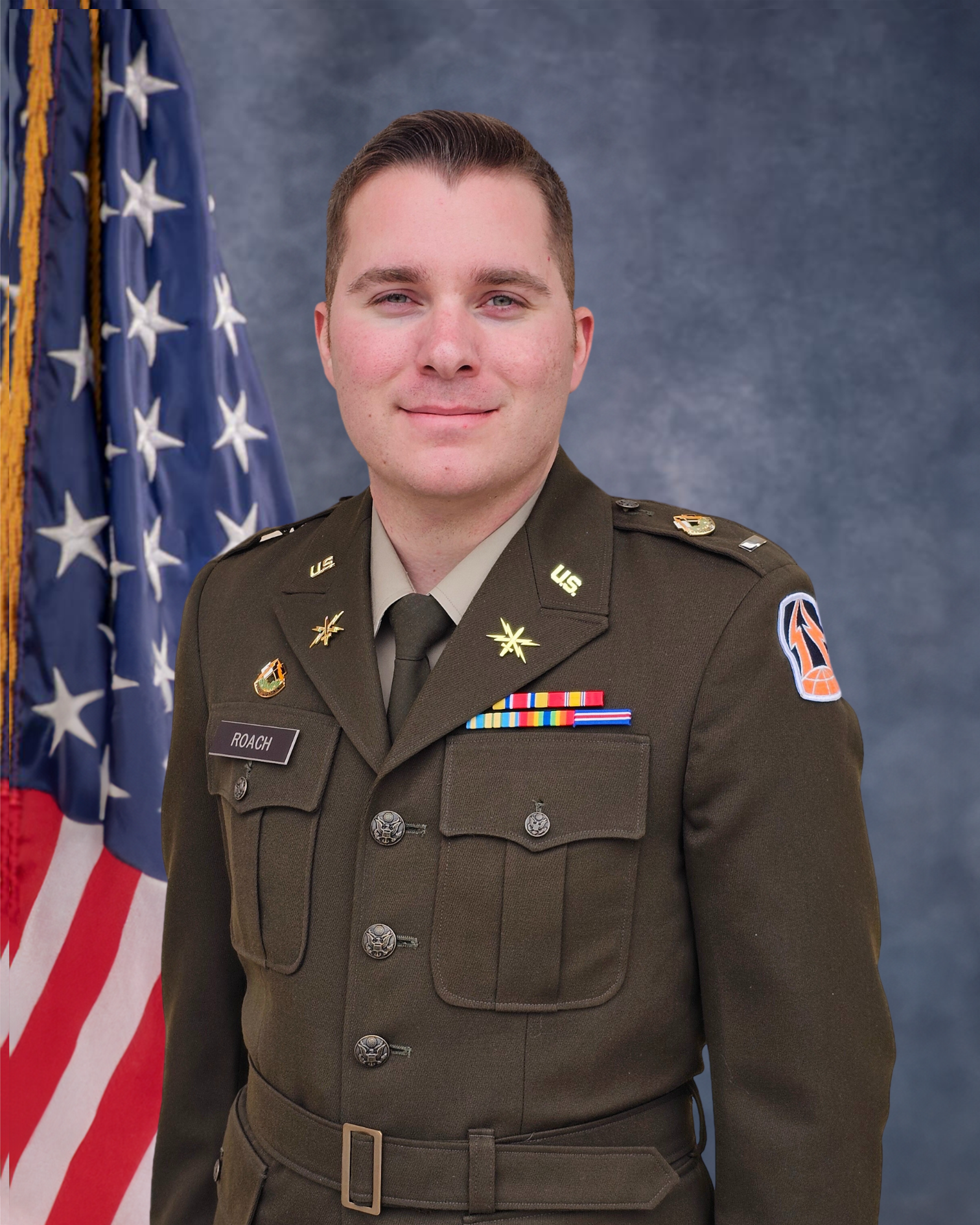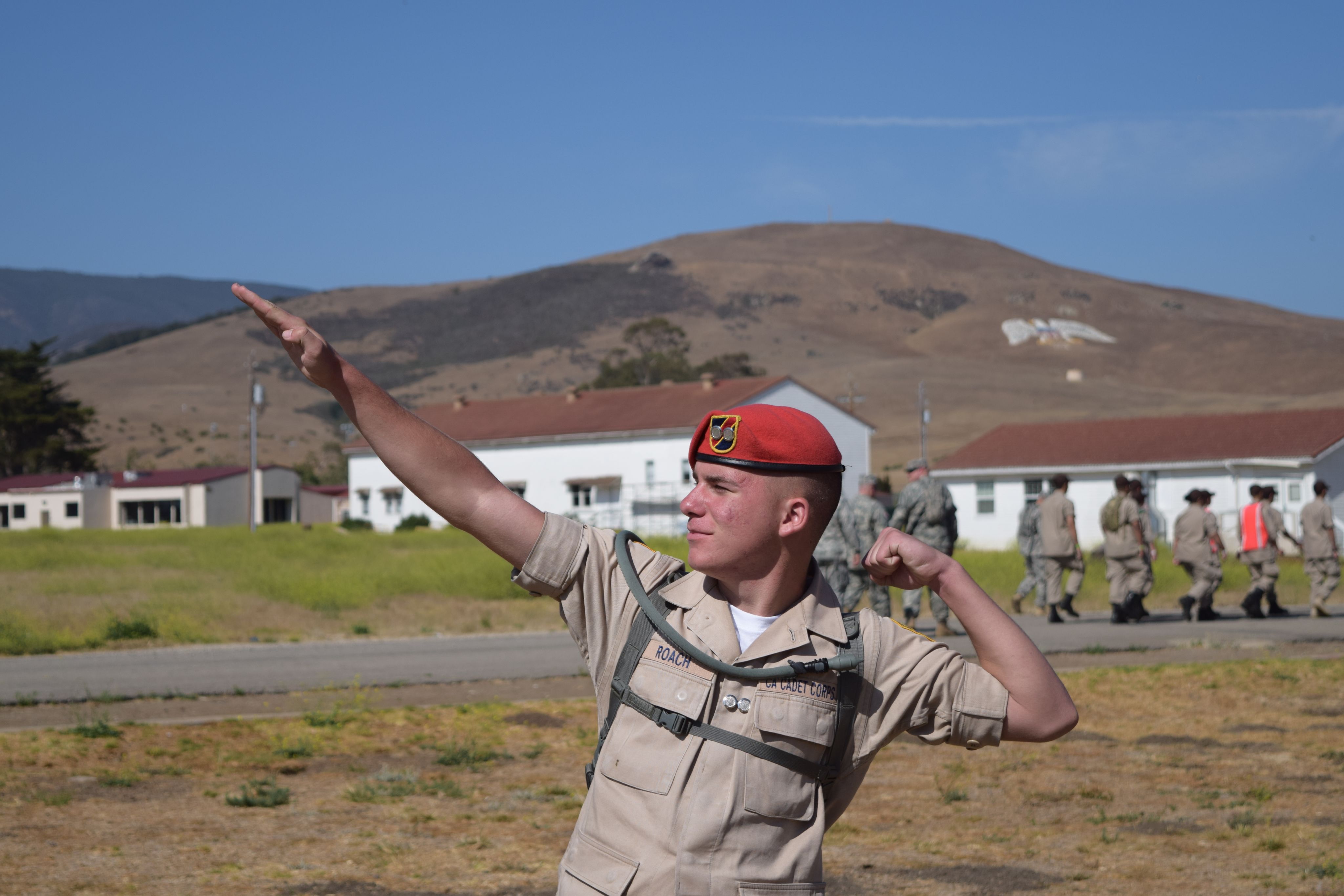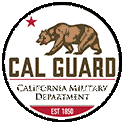Amazon engineer credits Cadet Corps for success



When 1st Lt. Andrew Roach, a Cyber Operations Officer in the Army Reserves, graduated from Riverside Preparatory School's California Cadet Corps program in 2016 having attained the rank of Cadet Major, he immediately enrolled in an Army Reserve Officer Training Corps (ROTC) program at Seattle University on a full scholarship.
"The California Cadet Corps has shaped all aspects of my life — military or civilian career included," said Roach, who now works as an Amazon software engineer in his civilian career. "I began leagues ahead of my peers because of the knowledge provided to me from the Cadet Corps."
We sat down with Roach to find out how his Cadet Corps training propelled him forward in his career.
JB: What inspired you to join the California Cadet Corps, and how has this decision shaped your career in the military and as an Amazon Engineer?
My father inspired me to join the California Cadet Corps (CACC). He served in the Army during Desert Storm as an 88M truck driver. Despite my influence from my father in that regard, I was mostly raised by a single mom who remarried during my childhood. I grew up in a rather damaging environment prior to that. A family friend advised my mom that it might be in her best interests to enroll my twin and I in a JROTC-like program, and my school happened to have the CACC that we could join.
Some of the most important aspects I was able to transfer into my military training and career are the planning and organizational skills — many of which I still employ today in my position as a Cyber Protection Team Mobilization Officer. In the civilian world, I work as a software engineer at Amazon, and the easiest way to describe my position there is simply an expert problem solver — a skill that the Cadet Corps excels with instilling in their Cadets. On my day-to-day, we are expected to take large, ambiguous tasks and break them down into bite-sized chunks by designing systems that be implemented and written into software. A critical aspect I took from the Cadet Corps that aids me in my career with Amazon is the ability to influence change even at the bottom level — leadership among peers and ownership. Those skills have carried me far in a short time working in corporate America and it's something I can never stress enough when encouraging students to join the program.
JB: In what ways has the CACC prepared you for your career, and what advice would you give to current cadets aspiring to follow a similar path?
Some specific skills that the CACC has prepared me for my career with was a deep understanding of hierarchical leadership, my place in it and how to navigate it to accomplish tasks effectively; the power of networking with coworkers, peer-to-peer level leadership, and the constant attention to detail. Whether you want to be a software engineer, an Army officer or both, reinforcing the soft skills that the Cadet Corps teach is essential to success afterwards. Allow yourself to fail and never be afraid of it. The people I work with that are the most successful are not measured by their success but by the sheer volume of their failures that they were able to learn and grow from. The safe leadership laboratory that the CACC provides to teach Cadets real life scenarios where they can learn from their failures as well as their successes is what makes it an incredible program. The Cadets that graduate from our program have failed tens if not hundreds of times more than their equivalent non-Cadet peers, and that is invaluable. In order to follow a path similar to mine, begin planning now. Just like any mission that you might plan in the Cadet Corps: your life, your career, and the direction you want to head is just another plan. Plans change, and that's okay, but having something to work towards is essential. If you are looking for more specifics on how to chase goals similar to mine to build your own plans, feel free to reach out and I would be happy to guide.
JB: What is your current military job title/unit, and could you elaborate on the initiatives your team has undertaken to modernize the CACC's digital presence, including the website revamp and the development of the CACC App?
I am currently serving in the Cyber branch as a Cyber Operations Officer (17A) at the rank of 1st Lieutenant in the Army Reserves. Specifically, in my unit, I serve on the battalion staff working Cyber Protection Team 189's Mobilization Officer, as we prepare to mobilize in September of '24.
Upon returning from Army Cyber school in the Fall of 2022, I presented a long-range plan aligned with Col. Michael Smith's strategic objectives to modernize the CACC's digital presence. The plan included a website revamp, app development, LEAD Foundation website revamp, and a complete overhaul of current operations task management and automation - among several other smaller initiatives. I employ a team of 3 developers including myself - 2nd Lt. Jacob Lapin, a recently featured alumni and West Point graduate, and Chief Warrant Officer 2 Kennen DeRenard, a software developer at Apple and a long standing supporter of the program as my best friend. Since having my plan approved in December '22, we have set to work on redesigning the entire website by upgrading the architecture, enhancing the user interface, and improving the overall user experience. Our goal with the website was to design everything with mobile in mind - something the old website did not feature - as over 90% of our traffic these days comes from mobile browsers. On the topic of the Cadet App, we are currently in the prototyping and wireframing phase as we just finished the deployment of the new website. Our development effort has split between shipping more less-critical features for the site, and designing out what we want the Cadet App to look and feel like. We are confident we will have an internal test version coming in late winter 2024 for the team to try out. As I mentioned initially, our modernization effort will span multiple command tenures provided we are approved to continue to write code to pursue this passion!
JB: How do your experiences in the CACC relate to your time in college, and how have these experiences influenced your roles in the military and at Amazon?
CACC was quite a bit different than my time in college and more specifically Army ROTC. CACC is more focused at the ground level on teamwork, basic military drill, uniform appearance, and instilling all of the values that come with it. At a higher level, the CACC instills planning and organizational skills that can be transferred to any successful organization. Army ROTC is far more focused on battle drills and physical training - so if this is an interest of yours, be sure to stay in shape! However, as you grow closer to commissioning, ROTC focuses solely on a Cadet's ability to plan a mission and organize a unit — something that the Cadet Corps does well to instill in their Cadets.
JB: Can you briefly describe your role and day-to-day operations as an Amazon Engineer, and what unique insights your military experience brings to the tech industry?
Something unique about Amazon is its diehard faith behind its Leadership Principles, as established by Jeff Bezos. A lot of these same principles align closely with the principles taught to Cadets in the CACC. As a software engineer working at Amazon, I work on a new version of the Fire TV (also known as the Fire Stick, Fire Cube, etc). The team I work on is the Launcher experience — the screen that users are taken to right as they finish the setup of their devices. As a high visibility screen, we work hard to ensure that the Launcher meets all specifications for user interface (UI) and user experience (UX) to include a smooth performance, a nice look, and seamless operations between applications. Most recently, I have worked on features such as Rehydration (the tech used to bring the application back seamlessly after it is closed to preserve memory), Internationalization, and by leveraging my Army experience, Security. Since having gone to school and gaining real-world experience working in Cyber security with the Army, I was able to transfer many of those skills over to become a Security Certifier with Amazon to conduct reviews on software to ensure they meet all security specifications and ship without vulnerabilities. Other than purely technical skills, I know I bring a unique perspective to my team at Amazon as a military member through the leadership experience I have gained from the CACC and the Army. I frequently take on leadership roles on top of my job as an engineer, such as a Scrum Master, Security Certifier Organizational Advisor, and Engineer Lead for certain projects. For certain, leveraging those soft business skills that the corps teaches has helped fast track my career.
JB: Are there specific moments or memories from your time in the CACC that stand out as particularly impactful or influential in shaping your character and career?
My most influential moments with the Cadet Corps were my time spent on the 18th Brigade staff as the Executive Officer and Commander. Most of my experience working with and developing people were grown during this time. At the start of command in my junior year, I was able to build a staff from just the command team to a full staff by the end of the year. My most successful accomplishment was the joint Officer Candidate School and Advanced Non-Commissioned Officer Academy that I planned along with my Command Sergeant Major. I believe that the event was a major success because of the freedom I had to plan it and put everything I had learned up to that point into it. Years later, I still use many of the lessons I learned from that experience in my career.
Another major influential experience that helped to shape my interactions in the working world was during my time with the 10th Corps staff and the direct mentorship I received from adult personnel and the scale at which we were planning operations. During my time on the 10th Corps, I served as an Assistant S-2 and later the S-3, Training and Operations Officer. Specifically, when I was an Assistant S-2, I worked closely with Lt. Col. (at the time) Michael Smith, and appreciated the guidance and feedback I received frequently during my development. I was always an inquisitive youth, and I was able to learn a lot from the example set from someone who now serves as our Executive Officer, for good reason.
JB: What key skills and lessons learned in the CACC do you believe are crucial for success in both military and civilian contexts?
There are three key skills learned in the CACC that are crucial for success in life: attention to detail, empathy, and organizational skills. Your ability to set a standard, hold others accountable, and keep yourself squared away in the right uniform, at the right time, and at the right place will carry you far in life. It seems like such a simple skill to master, but the inability for people to do this well or consistently is far more prevalent than you realize. The ability to connect with others and understand things from their perspective, will help you master relationships early which will be force multiplier for your career — not to mention build you better friendships. Lastly, the task-oriented skills that we learn in staff and command positions to disambiguate problems by breaking them down into bite-sized chunks, build trackers, write and brief professionally, and execute missions will put you leagues above your peers at the time of graduation. These are all skills you will look back on and attribute back to your time in the Cadet Corps.

